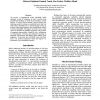Free Online Productivity Tools
i2Speak
i2Symbol
i2OCR
iTex2Img
iWeb2Print
iWeb2Shot
i2Type
iPdf2Split
iPdf2Merge
i2Bopomofo
i2Arabic
i2Style
i2Image
i2PDF
iLatex2Rtf
Sci2ools
100
click to vote
AAAI
2008
2008
An Integrated Reasoning Approach to Moral Decision-Making
We present a computational model, MoralDM, which integrates several AI techniques in order to model recent psychological findings on moral decision-making. Current theories of moral decision-making extend beyond pure utilitarian models by relying on contextual factors that vary with culture. MoralDM uses a natural language system to produce formal representations from psychological stimuli, to reduce tailorability. The impacts of secular versus sacred values are modeled via qualitative reasoning, using an order of magnitude representation. MoralDM uses a combination of first-principles reasoning and analogical reasoning to determine consequences and utilities when making moral judgments. We describe how MoralDM works and show that it can model psychological results and improve its performance via accumulating examples.
AAAI 2008 | Intelligent Agents | Moral Decision-making | Moral Decision-making Extend | Psychological |
Related Content
| Added | 02 Oct 2010 |
| Updated | 02 Oct 2010 |
| Type | Conference |
| Year | 2008 |
| Where | AAAI |
| Authors | Morteza Dehghani, Emmett Tomai, Kenneth D. Forbus, Matthew Klenk |
Comments (0)

